I climb the stairs and meet the heavy wooden front door, deciding to ring the bell to spare my knuckles the pain from announcing my arrival.
Moments later, the door opens and author and owner of the Santa Barbara Writers Conference, Monte Schulz appears.
He is barefoot dressed in dark slim jeans and a casual button-up shirt.
His long blonde tousled hair accentuates his youthful spirit, something I’ll discover soon enough.
“I totally forgot about the interview, and I knew I would, which is why I wanted to meet here. Come in!”
I follow Monte through the foyer and down the hall toward the office, a cozy room anchored with two desks and shelves full of books of assorted genres.
He asks if I’d like to hear his newest creation, a song entitled, “Age of Sorrow” which will debut on his next album, a follow-up to Seraphonium, his first.
In true Renaissance man form, Monte is also a singer/songwriter.
It can be said that Seraphonium is Monte’s alter-ego, an outlet for his euphonic inner self.
He leans over, clicks play on the computer, and soon the melodic journey begins.
The ballad is powerful and the words, longing with harmonies that build and build, creating waves of emotional resonance.
Once the song is complete, I’m eager to learn more about his creative process and life as a writer.
Write On
I start with questions about his latest written work, a Jazz-Age Great American Novel, titled Crossing Eden, which was written as an homage to his father, Charles M. Schulz.
Monte grabs the book from the shelf, settles on a page, and reads aloud.
His passages are rich in description.
I close my eyes and let the scene play out in my mind, drifting through sights, sounds, smells, and colors.
He gives just enough detail to shape your own personal version of his world and leaves out enough to keep your imagination at play.
Crossing Eden, published by Fantagraphics, is a narrative set in the late twenties, an age of opulence teetering on the edge of the Great Depression.
The 1088-page tome contains four individual stories of the Pendergast family who are set apart due to hard times.
The vignettes take place in the Midwest, East Texas, a vibrant city of the author’s own making, with the narrative set in California.
Monte chose these locations in order to give the reader a diverse grasp of American life of the era and analyzed period texts to bring authentic tone and speech to the work.
For example, he used a love letter, verbatim, written in 1916 by his grandfather to his maternal grandmother and researched fifty-eight books of that time to build one chapter.
This novel is an example of Monte’s perseverance and comprehension of one’s strength as a writer.
When The Writing Bug Bit
At twenty-three, inspired by works of Thomas Wolfe and John Steinbeck’s East of Eden, authors of his father suggestion, Monte had it in mind that one day he, too, would write a Great American Novel.
He put pen to paper but came to the realization he hadn’t yet the skill to produce a work of this grandeur.
“I wrote Down by the River (my first novel) to see if I could publish a book, or to find out that my writing was not good at all and I was totally delusional.”
Turns out he wasn’t delusional, or he was just delusional enough.
In 1990, Viking Press (now Penguin Random House) bought his first book, but Monte wasn’t altogether satisfied.
“I felt like I wished I had written a better book, a more ambitious book, a big literary novel not a crime novel set in a small town.”
Time passed and Monte kept writing, published several books, and became a stronger writer. Ultimately, the foundation of what would become his most significant written work took shape.
“I finished the basic structure of the book in 1999. When my dad was still alive,” he says.
“And then I wrote the prologue, these four vignettes, four-page interludes, and the epilogue. I felt my dad had to die before I could write the epilogue. It was something I needed to do. It was very personal.”
He dedicated his entire forties to complete Crossing Eden. Once his father had passed, Monte was able to pay the greatest tribute – the final words of his greatest work of art.
Once Upon a Time…
Monte’s interest in writing began through music when the college hockey player/German major and French minor found he had a skill for revising songs.
“I remember rewriting the lyrics to the Rolling Stones ‘Ruby Tuesday’ and I discovered I had a talent for writing lyrical lines.”
Then came a song which altered Monte’s outlook on life, a verse in “Helpless” by Neil Young:
Blue, blue windows behind the stars,
Yellow moon on the rise,
Big birds flying across the sky,
Throwing shadows on our eyes.
“And somehow at twenty or twenty-one years old, I saw the world differently. I saw it in an artistic way,” Monte says.
“Also, I was reading about California and I started writing poetry.”
His father, the influential cartoonist and Peanuts creator Charles M. Schulz, also took note of his son’s interest, steering him to the pages of Carl Sandburg.
Monte then found the works of Joan Didion and inspiration snowballed into a twenty-six-page poem about California which he brought to a poetry workshop, lead by Chuck Edwards, at the first Santa Barbara Writers Conference he attended with his father in 1975.
“The three days I was at there, all they did was talk about my poem,” he said.
“That was very encouraging.”
To Be or Not To Be
Monte checks the clock and hops out of his quilted leather chair.
“I’ve got to take the boys to tennis. It’s just right up the road. Would you like to come? We can continue in the car.”
We head out of the office and make our way back to the foyer.
“Boys!” he yells up the stairs, “time to go!”.
Moments later, I meet Wesley and John Henry. Two well-mannered young men with bright blue eyes marked by the same sparkle as their father’s.
We exit the house one-by-one, tennis gear in tow, and crunch our way across the gravel drive and pour into the car.
As we pull out of the driveway, Monte flashes back to a similar experience.
It was the early sixties and his father was being filmed for a documentary.
“They interviewed (my dad) on camera as he’s driving us to school. All of a sudden, I got a glimpse of this. It was for a documentary called, “A Boy Named Charlie Brown”.
Monte’s face lights up when he speaks of his father and the wisdom he’s passed on.
“’There’s no such thing as writer’s block.’ My dad told me that years ago. He put it like this, ‘Only amateurs get writer’s block. Professionals can’t afford it.’”
We enter the grounds of the tennis club and park out front.
“Ok, boys! Bounce out. I’ll come to get you guys. Enjoy your time.”
They climb out of the car and grab their tennis gear from the trunk. We wave goodbye and head back to the house.
Homage To The Past
I’m curious about Monte’s early experiences at the conference.
He relays a story of his second, maybe third, visit to the SBWC, a visit with a much different outcome than his first.
“I read a scene, just to introduce a couple of characters. I thought if it was well written, it would be good,” he said.
“But instead, the field didn’t like it and one of the workshop leaders said, ‘This scene is just a black hole. And this writer doesn’t show any gift for creativity whatsoever.’ My dad’s head almost blew off. It’s funny because the scene is in Down by the River verbatim. I just moved it.”
He’s had several opportunities at literary fame, all of which ended just shy of celebrity.
“The muse has visited me and said, ‘Monte, here’s a story. You can create great works of art in writing your music or you can have commercial success. But you can’t have both. So what’s it’s going to be?’
“Commercially, as an artist, I am a black hole. Everything hits and dies here with me. And I’ve accepted it. It doesn’t dissuade my art at all.”
As we turn on his street and head toward the gravel drive, I ask what encouraged him to buy the conference six years ago.
He references a line spoken by actor Alastair Sim who played Scrooge in the 1951 film version of A Christmas Carol.
When Scrooge is asked to sell the vested interest in his business, he replies, “It’s not just for money alone that one spends a lifetime building up a business…It’s to preserve a way of life that one knew and loved.”
Monte shares this same vision.
“When I think of SBWC, I think of one thing.
“I think of a spot at the old Miramar where the tennis courts were and where they used to have the train and a little sundeck for people to have lunch.
“And I picture my dad, Ray Bradbury or Barnaby Conrad in their tennis shorts, wandering the grounds, playing doubles, and people walking by with books and that sort of thing,” he says.
“My memory, my thought, my present of the SBWC actually exist in the past. I bought the conference to preserve that part of my life knowing it was going to be good for other people.
“In that context, whether the attendance is up or down, it doesn’t mean anything to me. What matters is that it goes on. I’m impervious to criticism that way. I’ve kept it the way it always was. The way it was back at the Miramar and that’s enough.”
He parks the car and I open the door to step out.
The late afternoon sun begins to fade and I pause to take in the quiet of the golden hour.
A Society Of Writers
I have one question before we part ways.
What would he like for people to take away from the conference?
His answer is the reason why I and other writers rely on and cherish the SBWC.
“The idea of being in a society of writers. It’s mostly to celebrate the writer’s life with people who share the same passion as you do.
“I don’t see any greater reason to have the conference other than that. People feel buoyed by going there and being surrounded by writers. I think that’s important.”
To learn more about the conference and events open to the public, visit www.sbwriters.com
After reviewing more than 250 entries from all over the United States, the SBWC would like to congratulate 3 winners who won full-tuition scholarships to this year’s Santa Barbara Writers Conference.
Prose Winner: Melanie Howard. Alexandria, Virginia
Excerpt from an autobiographical novel:
It would be nice if the night that changed my life had happened in Paris, on rain splattered ancient streets, or on one of those bleached Greek island outcroppings overlooking an azure sea. But life – my life anyway – is not a romance novel. That night, I was the unlikely final third of a trio of blue-jeaned Lolitas, sipping cherry cola Slurpees on the curb in front of 7-11, barefoot among the pop-tops and cigarette butts. I remember I’d used heroic amounts of Cover Girl Erase to try and disguise a zit on my chin, and it itched miserably, but I was determined not to touch it. I’d spent hours perfecting my appearance, and worried that the August humidity would not only melt off my Erase, but also frizz my hair. I’d spent a tortured night sleeping in orange juice cans, it hung straight below my shoulders, just like Julie’s on The Mod Squad.
This was the era of sunny girls who lightened their hair with Sun-In and tanned their skin with oil that smelled of coconut, who wore Love’s Baby Soft and pulled the wings on their Sun In streaked hair back with baby girl barrettes shaped like bows. I was trying hard to be one of them. I’d just moved here, to Hampton, a military town on the edge of the Chesapeake.
Thick glasses and a love of reading had put me on the very bottom of the social food chain in my early teen years, spent in a split-level outside Washington, DC. Over the summer, I’d gotten both contact lenses and boobs. And I realized, when I arrived at our new half-built housing development, that no one there knew that in my previous incarnation, I’d been the nerd who even the boys in Advanced French wouldn’t dance with at school sock hops. This was 1972, and there was no Instagram or Facebook to follow me. I decided to invent a past as a popular girl. This was a risk, of course, because I had no inside information about how popular girls behaved. But I knew how to recognize opportunity. So when Cathy and Sally showed up on my doorstep to ask if I would go to them to a party on Saturday night, I took one look at them and said yes.
“You know, there will be drinking and maybe some pot,” Sally had said in a low voice, after peering behind me to make sure my mother wasn’t nearby.
“I’ve never had a marijuana cigarette,” I blurted out.
Cathy and Sally exchanged looks, their eyes sliding sideways and down. I had said precisely two sentences but had already blown it, condemning myself to another night in my room with my two closest friends, Simon and Garfunkel. “You know what the Sounds of Silence really sounds like, right?” my father had said last night. “I’ll give you a hint. There’s no hippie crap playing on a record player.”
Prose Winner: Wanda Maureen Miller. Manhattan Beach, CA
Excerpt from an autobiographical novel, LAST TRIP HOME:
I buried Daddy on Christmas Eve, 1995, in Arkansas. Even in death, he was inconsiderate. Nick and I were getting ready to go to a private party at our tennis club when Aunt Desser called with the news. It was always my aunts, Desser or Guster, Daddy’s younger sisters, who called with bad news. None of my older relatives had owned telephones long enough to feel free to waste hard-earned money on a long distance call just to chat. I had longed for this call all my adult life.
In my reoccurring pre-menstrual murder fantasy, Daddy’s death is always dramatic. The setting is the middle of the night in the sharecropper shack. He is driven over the edge, by despair or perhaps by some act of disobedience, maybe mine. He and Mama are in the front bedroom. He shoots her first with the .22 rifle he uses for squirrel hunting.
Asleep in the side room, I am awakened by the shot and filled with dread, but I am frozen, unable to move. I conveniently remain frozen while he continues his bloody path through the front room, where my younger handicapped sister, Violet, is asleep on a pallet. I hear Violet’s piteous cries as she begs him not to kill her. One more shot and I am up. I stumble over the trunk on the floor and am unable to save my sister.
I hear him thump heavily into the middle room, where so many bad things happened. I turn on the light and fearlessly fling myself at him before he shoots my older brother, Joe Buck. Sometimes I allow Daddy merely to wound Joe Buck, so I will have to drag us both to the hospital later. Daddy is always wearing the dingy white jockey shorts he wore when he walked around the house at night, when he sat in the pink plastic platform rocker and read or watched television. With superhuman strength, I wrestle the gun away from him. Sometimes he shoots me in the struggle, a serious wound but not mortal.
He throws me against the wall, but I keep coming back. Sometimes I beat him to death with his own gun. I never shoot him. That’s too quick and impersonal, to let a bullet kill him. I prefer hands on. Touching him in real life repels me, but in my revenge fantasy, I am thrilled to grab him by his leathery neck and beat his head against the wall until his skull turns to mush and his brains drain through the hole in the floor where I used to sweep dirt. His last breath makes my breath quicken.
The reality was less dramatic. Aunt Desser got right to the point. “Grace Mayree, your daddy’s dead.”
First Sentence Winner: Sharon Brown. Carlotta, California
Dragon bites take forever to heal, but that was the least of my problems.
PDFs here: The Santa Barbara Sentinel
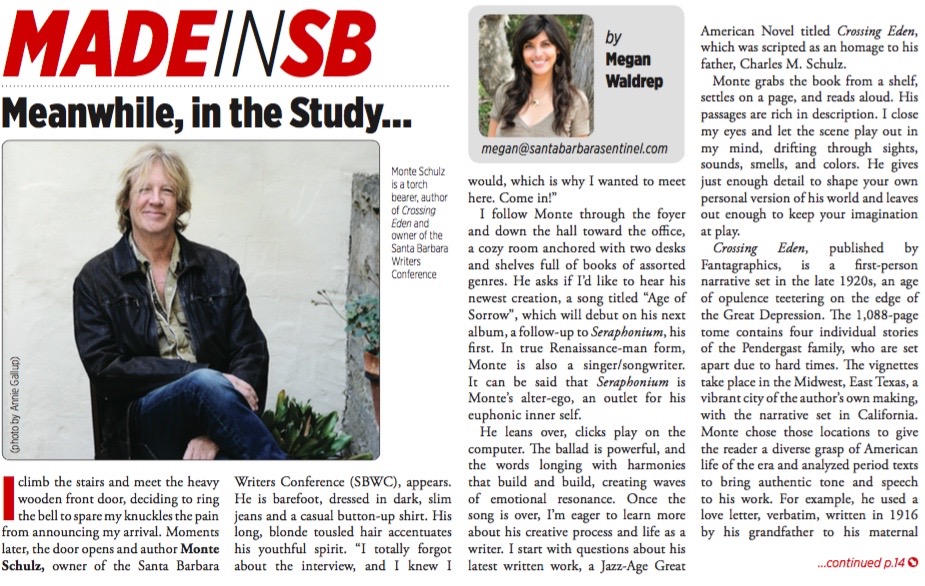
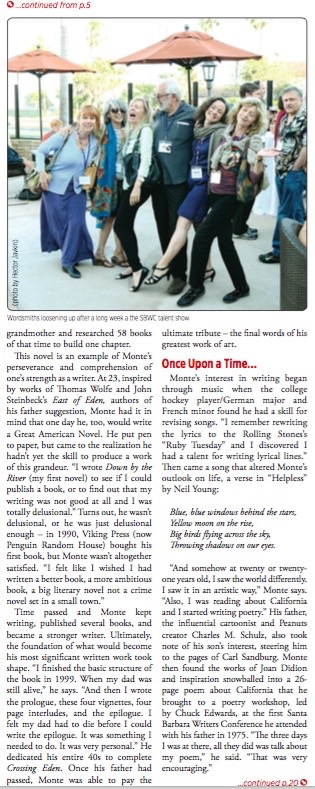
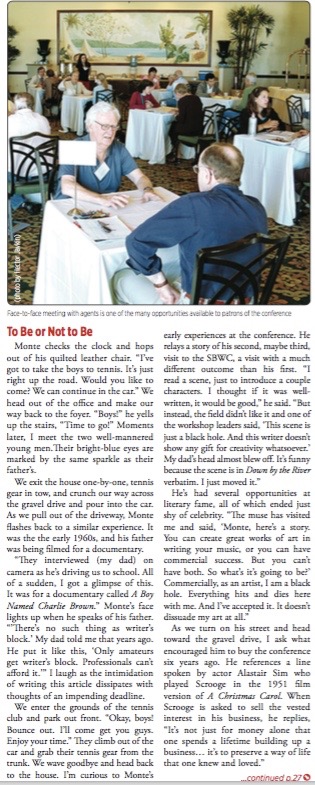
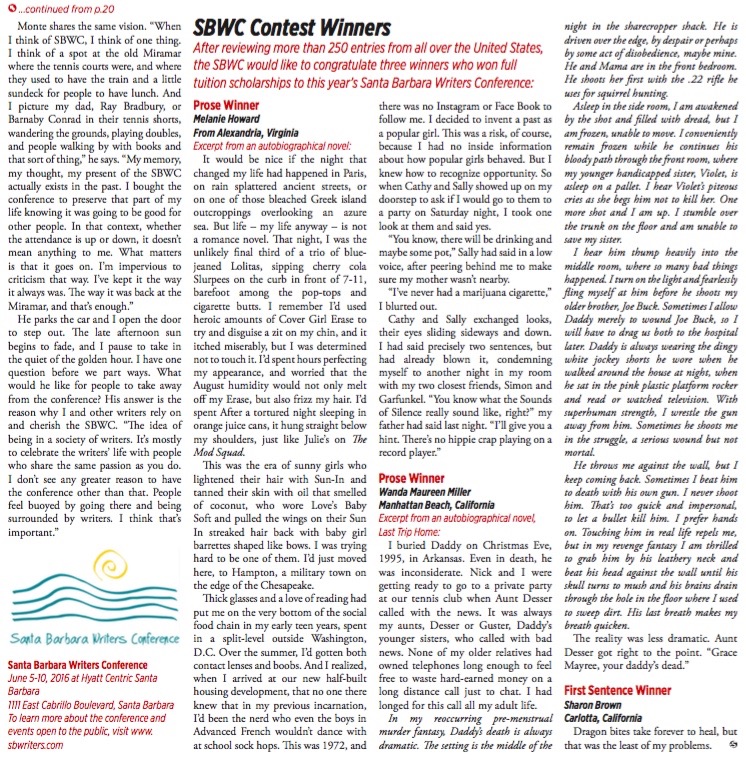
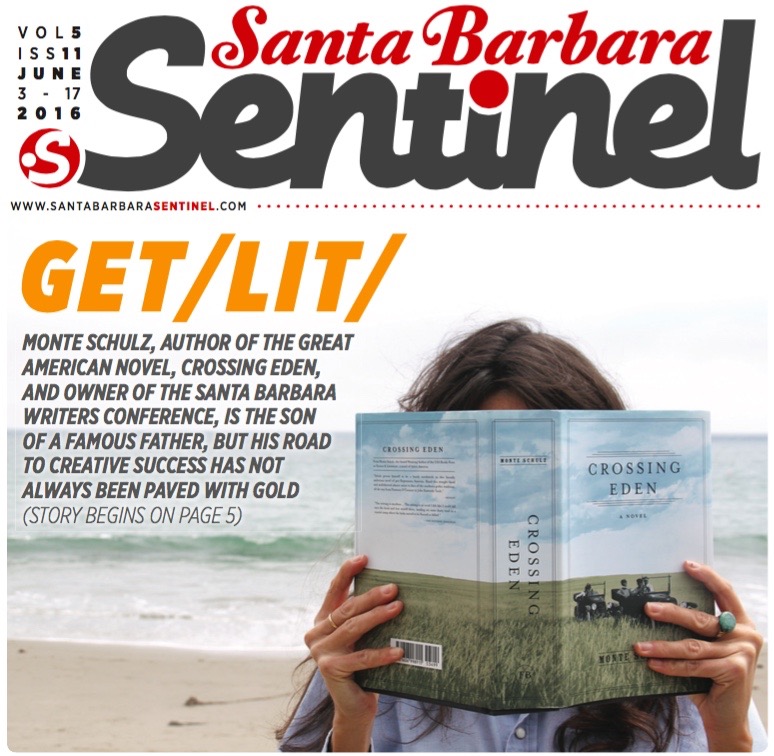

Okay, I love that phrase: turns out he wasn’t delusional or just delusional enough! Yes, writer goals!
Ha ha! That may be my favorite take away, too. I’m so glad you enjoyed it! I guess that goes for all writers – we have to be just delusional enough to gain the confidence to put our art into the world. Can be scary AF! Thank you for your comment! Love having you a part of the conversation! xo